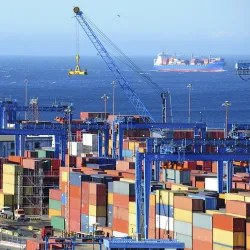Aspects of freight forwarding
2023-11-24
Freight forwarding is a service that involves the organization and management of the transportation of goods from one point to another on behalf of a shipper. Freight forwarders act as intermediaries between shippers and various transportation services, coordinating the logistics and ensuring the smooth movement of goods. Here are key aspects of freight forwarding:
1. Services Provided by Freight Forwarders:
- Booking and Coordinating Transportation: Freight forwarders arrange the transportation of goods using various modes such as air, sea, rail, or truck, depending on the requirements of the shipment.
- Documentation: They handle the necessary documentation, including bills of lading, commercial invoices, and customs documentation required for international shipments.
- Customs Clearance: Freight forwarders assist with customs clearance procedures, ensuring that shipments comply with import and export regulations.
- Insurance: Some freight forwarders offer cargo insurance services to protect goods against loss or damage during transit.
- Warehousing: Some freight forwarders provide warehousing services for temporary storage of goods during transit.
2. International Freight Forwarding:
- Freight forwarders specializing in international shipping manage the complexities of cross-border trade, including dealing with multiple customs authorities and adhering to international regulations.
3. Domestic Freight Forwarding:
- Freight forwarders may also operate within a single country, coordinating the transportation of goods within national borders.
4. Modes of Transportation:
- Freight forwarders work with various transportation modes, including air freight, ocean freight, rail freight, and trucking, to meet the specific requirements of the shipment.
5. Consolidation and Deconsolidation:
- Freight forwarders often consolidate smaller shipments from multiple shippers into a single larger shipment to optimize transportation costs. They may also deconsolidate shipments upon arrival to distribute them to their respective destinations.
6. Door-to-Door Services:
- Some freight forwarders offer door-to-door services, handling the entire logistics process from the shipper's location to the recipient's doorstep.
7. Freight Rate Negotiation:
- Freight forwarders negotiate rates with carriers on behalf of shippers to secure cost-effective transportation options.
8. Supply Chain Management:
- Some freight forwarders provide end-to-end supply chain management services, offering comprehensive logistics solutions beyond transportation, including warehousing and distribution.
9. Technology Integration:
- Many modern freight forwarders use technology and software solutions to streamline processes, track shipments in real-time, and provide visibility to shippers.
10. Regulatory Compliance:
- Freight forwarders are knowledgeable about import and export regulations and ensure that shipments comply with the legal requirements of the countries involved.
11. Documentation and Paperwork:
- Freight forwarders handle the preparation and processing of shipping documents, reducing the administrative burden on shippers.
Using a freight forwarder can be advantageous for businesses, especially those involved in international trade or dealing with complex logistics. It allows companies to focus on their core business while leveraging the expertise of professionals to manage the intricacies of transportation and customs procedures.



